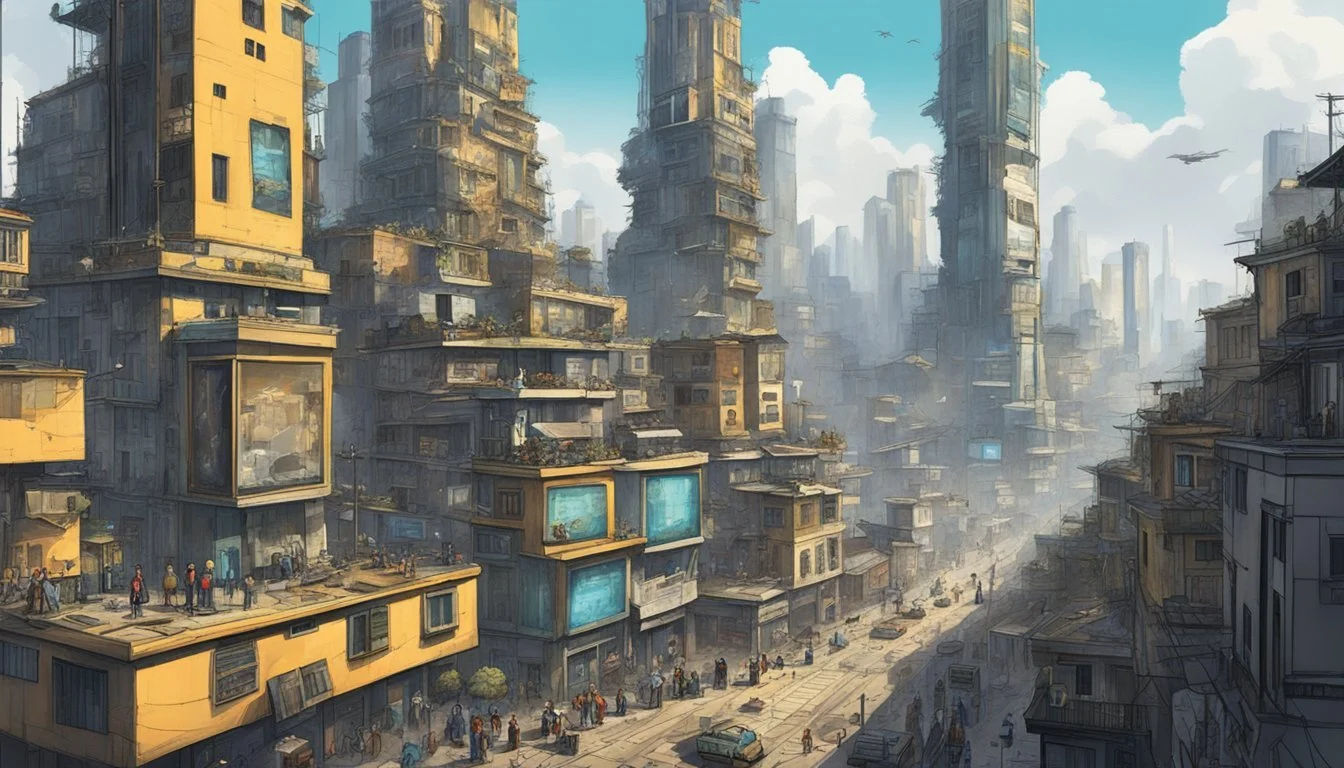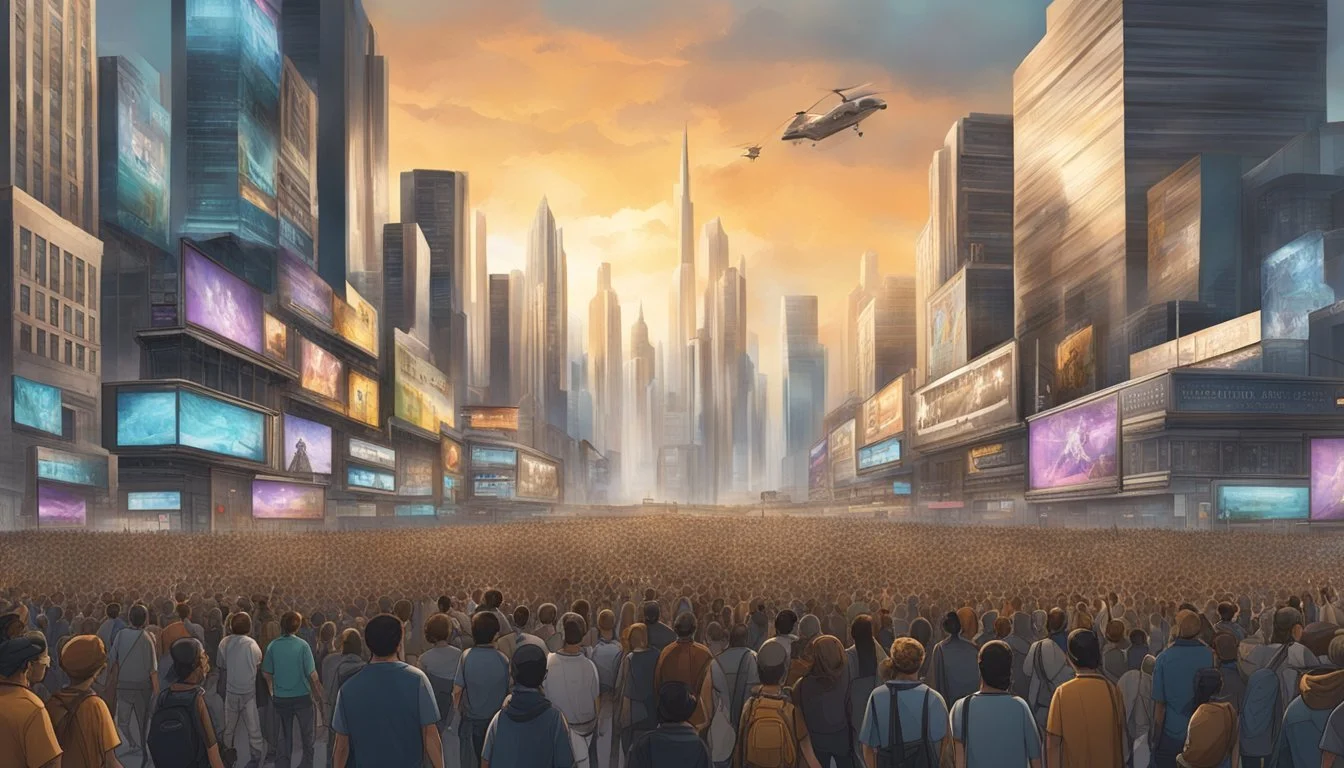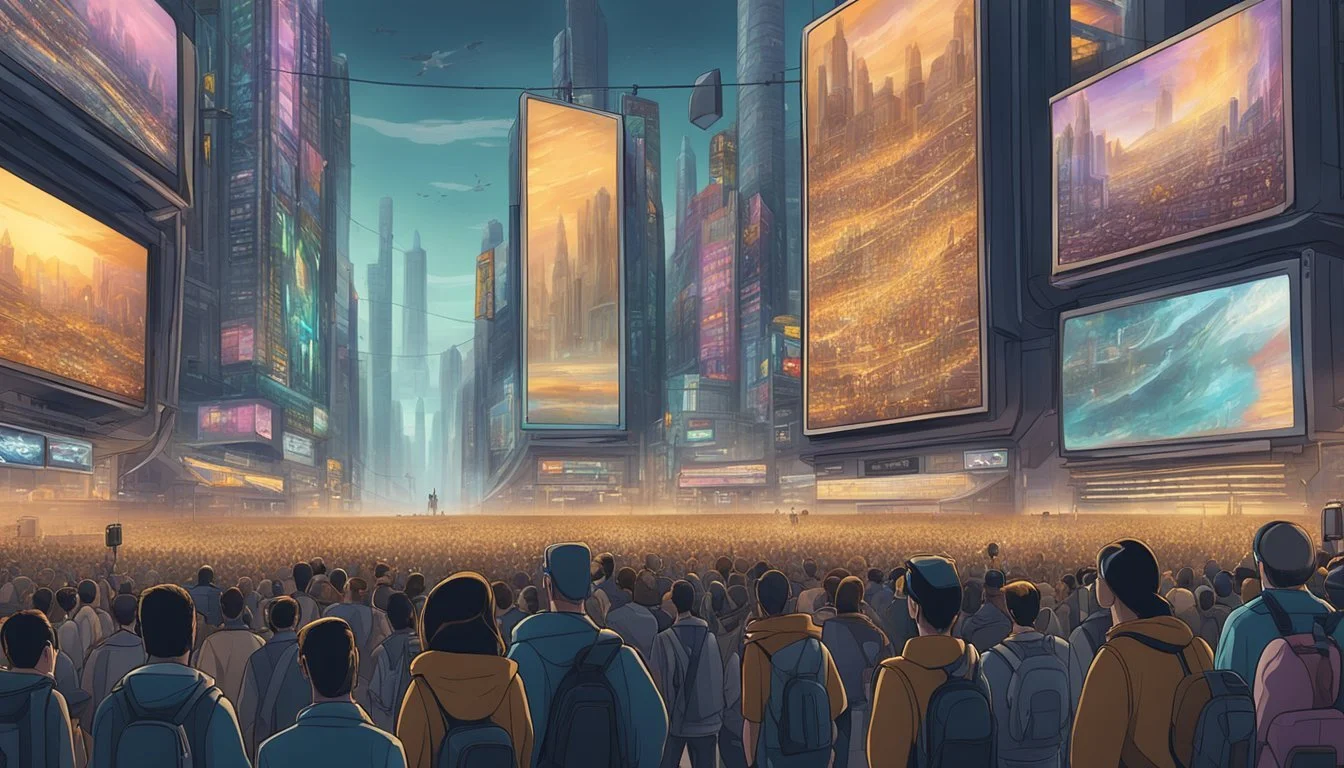The True Hunger Games: Reality TV's Dark Inspirations
Examining the Disturbing Roots of Popular Entertainment
The Hunger Games captivated audiences with its dystopian world of teenage tributes fighting to the death. While the concept may seem far-fetched, its origins lie closer to home than many realize. Author Suzanne Collins found inspiration for The Hunger Games by channel surfing between reality TV shows and war coverage, blurring the lines between entertainment and real-world conflict.
This juxtaposition of manufactured drama and genuine peril sparked the idea for a story that would critique society's appetite for spectacle. Reality TV programs like Survivor, with their contrived challenges and interpersonal conflicts, served as a template for the Games themselves. Collins saw parallels between these competitive shows and the gladiatorial contests of ancient Rome, where life-and-death struggles were staged for public amusement.
The Iraq War also influenced Collins' writing, as she considered how young people were being sent to fight in foreign conflicts. By combining elements of reality TV with the harsh realities of war, Collins created a narrative that resonated with readers while offering biting social commentary. The Hunger Games thus emerged as both entertainment and cautionary tale, holding up a mirror to our own society's fascination with voyeurism and violence.
Unveiling Reality TV's Illusion
Reality television presents a carefully crafted version of events, often blurring the line between authentic experiences and staged scenarios. The genre's appeal lies in its supposed portrayal of real people and situations, yet the truth behind these productions is far more complex.
The Concept of Reality TV
Reality TV emerged as a popular entertainment format in the late 20th century. It purports to showcase unscripted situations, real-life participants, and genuine reactions. Shows range from competition-based formats to observational documentaries of people's daily lives.
Many viewers are drawn to the perceived authenticity and relatability of reality TV contestants. The genre's success stems from its ability to create engaging narratives around ordinary individuals facing extraordinary circumstances.
However, the "reality" in these shows is often heavily curated. Producers use selective editing, strategic casting, and controlled environments to shape compelling storylines and maximize drama.
Perceived Reality vs. Actual Events
The gap between what viewers see on screen and what actually occurs during filming is significant. Reality TV productions employ various techniques to manipulate audience perceptions:
Careful editing to create narratives
Encouraging conflict between participants
Reshooting scenes for better angles or reactions
Using scripted elements or prompted conversations
Participants may be given general directions or placed in specific situations to elicit desired outcomes. This manipulation can lead to misrepresentation of people's true personalities and relationships.
While some genuine moments do occur, much of what transpires on reality TV is orchestrated for entertainment value. Viewers should approach these shows with a critical eye, recognizing the constructed nature of the content they consume.
Historical Context
Reality television's competitive format emerged from earlier game shows and contests, evolving into more elaborate productions. The genre's development paralleled societal changes and technological advancements in media and broadcasting.
Origin of Competitive Reality Shows
Competitive reality shows trace their roots to the 1940s with radio quiz programs. Television adaptations like "Queen for a Day" in the 1950s introduced elements of personal storytelling and audience voting. The 1970s saw the rise of game shows like "The Dating Game" and "Family Feud," which incorporated interpersonal dynamics and conflict.
"An American Family" in 1973 marked a turning point, documenting real people's lives over an extended period. This paved the way for modern reality TV concepts. The 1990s brought "The Real World" and "Survivor," which combined competition with social experiments.
Evolution of the Genre
Reality competition shows exploded in popularity in the early 2000s. "Big Brother" and "American Idol" captivated audiences with 24/7 coverage and public voting. These programs blended elements of game shows, documentaries, and scripted dramas.
As the genre matured, subgenres emerged. Dating shows like "The Bachelor" focused on romantic pursuits. Talent competitions expanded beyond singing to include dancing, cooking, and various skills. "The Amazing Race" combined travel with challenges, while "The Apprentice" brought business acumen to the forefront.
Social media integration in the 2010s allowed for greater audience engagement and real-time interaction. This led to more elaborate productions and higher stakes, influencing the storytelling and competitive aspects of these shows.
Psychological Impact on Participants
Reality TV contestants face significant mental and emotional challenges. The pressures of constant surveillance, manufactured drama, and public scrutiny can take a severe toll on their well-being both during and after filming.
Stress Under the Spotlight
Participants in reality shows often experience extreme stress. The unnatural environment, lack of privacy, and pressure to perform for cameras create anxiety and tension. Sleep deprivation is common, as producers may film at all hours. Contestants frequently report feeling isolated from their support systems.
Many struggle with the blurred lines between their genuine selves and TV personas. The need to stay "in character" and provide entertaining content can be psychologically draining. Some resort to exaggerated behaviors or manufactured conflicts to gain screen time.
Rejection and elimination cause significant emotional distress. The fear of public humiliation looms large. Even "winning" can bring its own set of pressures and expectations.
Long-Term Effects on Contestants
The psychological impact of reality TV often extends far beyond filming. Many participants report difficulties readjusting to normal life after their time in the spotlight. Some struggle with depression, anxiety, or post-traumatic stress.
Public scrutiny can persist long after shows air. Negative portrayals may damage reputations and career prospects. Online harassment from viewers is a growing concern.
Positive outcomes are possible. Some contestants gain confidence or find new opportunities. However, studies suggest a significant portion experience lasting negative effects on their mental health and relationships.
Reality shows rarely provide adequate psychological support. Critics argue more safeguards are needed to protect contestants' well-being both during and after production.
Audience's Role
The audience plays a crucial part in shaping reality TV shows like The Hunger Games. Their engagement drives the narrative and impacts the fate of contestants, while raising ethical questions about viewership.
Viewer Engagement Strategies
Reality TV producers employ various tactics to keep audiences hooked. In The Hunger Games, viewers can sponsor tributes by sending gifts to the arena. This creates a sense of involvement and investment in the outcome.
Voting mechanisms allow audiences to influence eliminations or rewards. Shows often feature live polls, social media integration, and interactive apps to boost engagement.
Behind-the-scenes content and contestant interviews give viewers insider access. This fosters emotional connections with participants and fuels discussions among fans.
Ethics of Viewership
The morality of watching reality shows that exploit or endanger participants is a complex issue. Critics argue that viewers become complicit in the suffering of contestants by tuning in.
In The Hunger Games, the Capitol audience's enthusiasm for the deadly spectacle reflects real-world concerns about desensitization to violence in media.
Some defend reality TV viewership as harmless entertainment. Others see it as a form of voyeurism that commodifies human experiences and emotions for profit.
The line between observation and participation blurs when audience votes impact contestants' fates. This raises questions about responsibility and the power dynamics between viewers and participants.
Behind the Scenes
The production of reality TV shows like "The Hunger Games" involves intricate methods and careful editing to create compelling narratives. These behind-the-scenes processes shape the final product viewers see on screen.
Production Methods
Reality TV productions employ various techniques to capture authentic moments while maintaining control over the narrative. Producers often use multiple camera setups to ensure they don't miss key interactions between contestants. They may prompt participants with questions or scenarios to elicit desired reactions.
Some shows utilize hidden cameras or two-way mirrors to observe contestants without their knowledge. This allows for more candid footage. Producers also carefully select locations that provide both visual appeal and practical filming conditions.
Casting plays a crucial role in shaping the show's dynamics. Producers seek out personalities that will clash or form alliances, creating dramatic storylines. They may even plant actors or "plants" among genuine contestants to stir up conflict.
Editing Narratives
Editors wield significant power in crafting the final narrative of reality TV shows. They sift through hundreds of hours of footage to construct compelling storylines. This process often involves selective editing to highlight dramatic moments or conflicts.
Producers may use music, sound effects, and voiceovers to enhance emotional impact. They might rearrange the chronological order of events to build tension or create cliffhangers. Some shows employ "frankenbiting," where contestants' words are spliced together out of context.
Reality TV editing often focuses on creating distinct character arcs for participants. Editors may emphasize certain personality traits or actions to portray contestants as heroes, villains, or underdogs. This narrative shaping helps engage viewers and keep them invested in the show's outcome.
Comparative Analysis
Reality television and game shows have evolved significantly over the years, taking on new forms across different cultures. This analysis examines key differences between reality TV and traditional game shows, as well as how reality programming varies internationally.
Reality TV vs. Traditional Game Shows
Reality TV diverges from traditional game shows in several key ways. While game shows typically follow strict rules and formats, reality TV often blurs the lines between competition and unscripted drama. Game shows focus on skill-based challenges with clear winners, whereas reality TV emphasizes interpersonal conflicts and emotional narratives.
Reality programs like Survivor incorporate elements of both genres. Contestants face physical and mental challenges similar to game shows, but also must navigate social dynamics and alliances. The editing and production of reality TV heighten dramatic moments, unlike the straightforward presentation of most game shows.
Budget and scale also differ significantly. Reality shows often have larger production costs, exotic locations, and longer filming periods compared to studio-based game shows. This allows for more complex storytelling and character development in reality formats.
International Variations of Reality Shows
Reality TV concepts often get adapted for different markets, resulting in unique regional variations. The UK's Big Brother, for example, tends to cast more eccentric personalities compared to its American counterpart. Cultural values and audience preferences shape these differences.
In South Korea, reality competitions like Produce 101 focus heavily on the training and development of pop music idols. Japanese reality shows frequently incorporate physical challenges and comedy elements not commonly seen in Western versions.
Some formats translate well globally with minimal changes. The singing competition The Voice maintains a consistent structure across numerous international versions. Others require significant localization. The dating show If You Are The One in China features direct questioning about finances and marriage plans, reflecting different cultural norms around relationships.
Commercialization and Marketing
Reality TV programs like The Hunger Games leverage extensive marketing strategies and commercial partnerships to maximize profits. These shows blend entertainment with business in ways that blur ethical lines and raise questions about exploitation.
Sponsorships and Product Placements
Reality TV relies heavily on sponsorships and product placements for revenue. Shows prominently feature branded items and experiences as prizes or rewards for contestants. Logos and products are strategically placed in camera shots.
Sponsors may influence storylines or challenges to highlight their offerings. Some reality programs even build entire episodes around sponsored activities or destinations. This integration of advertising blurs the line between content and commercials.
Product placement deals can be extremely lucrative for networks and production companies. A single season of a popular reality show may generate millions in sponsorship revenue. This commercial element shapes the visual aesthetic and narrative focus of many programs.
The Business of Reality TV
Reality TV has become a massive industry driven by profit motives. Networks favor these shows for their relatively low production costs and high earning potential. A successful reality format can spawn international versions and lucrative licensing deals.
Casting focuses on finding provocative personalities likely to create drama and attract viewers. Producers often manipulate situations and edit footage to craft compelling narratives. The well-being of contestants may be secondary to ratings and revenue goals.
Merchandising extends the commercial reach of reality TV brands. Popular shows generate income through clothing lines, books, apps, and other consumer products. Some reality stars leverage their fame to launch business ventures or secure lucrative endorsement deals.
Cultural Influence and Public Perception
The Hunger Games franchise has profoundly shaped popular culture and altered public perceptions of reality television. Its impact extends beyond entertainment, influencing fashion, sparking social commentary, and raising ethical questions about media consumption.
Influence on Popular Culture
The Hunger Games sparked a surge in archery's popularity, especially among young girls. The iconic mockingjay symbol became a widespread emblem of resistance and hope. Fashion trends were influenced by the series, with Capitol-inspired styles appearing on runways. The books and films prompted discussions about social inequality, government control, and media manipulation in schools and online forums. Phrases like "May the odds be ever in your favor" entered common usage, often employed ironically to comment on unfair situations.
Public Attitudes Towards Reality TV
The franchise heightened public awareness of reality TV's ethical implications. Viewers became more critical of shows that exploit participants or glorify conflict. Some reality programs faced backlash for perceived similarities to the Games' manipulative tactics. The series sparked debates about the line between entertainment and exploitation in reality TV. Public discourse increasingly focused on contestants' well-being and the long-term effects of sudden fame. Some viewers reported feeling uncomfortable with shows that seemed to echo the Capitol's voyeuristic tendencies. The franchise's critique led to calls for more responsible production practices in reality television.
The Future of Reality TV
Reality television continues to evolve, pushing boundaries and embracing new technologies. The genre faces both exciting opportunities and potential ethical challenges in the coming years.
Trends and Predictions
Virtual and augmented reality could transform reality TV experiences. Shows may allow viewers to feel like active participants rather than passive observers. Immersive technologies could place audiences inside contestants' homes or alongside them during challenges.
AI-powered personalization may tailor content to individual viewers. Reality shows could adapt storylines and outcomes based on audience preferences and interactions. This level of customization raises questions about authenticity and manipulation.
Social media integration is likely to deepen. Contestants may livestream between episodes or engage directly with fans. Real-time voting and instant feedback could shape narratives as they unfold.
Potential for Innovation
Cross-platform storytelling offers new creative possibilities. Reality concepts may expand beyond TV to include podcasts, mobile games, and interactive websites. This approach could provide more in-depth character development and worldbuilding.
Niche programming targeting specific audiences could proliferate. Streaming platforms may invest in hyper-focused reality shows catering to particular interests or communities.
Ethical reality TV formats emphasizing personal growth, education, or social good may gain traction. Shows could spotlight real-world issues while providing entertainment value.
Data-driven production techniques may refine casting and storyline decisions. Analytics could help predict audience reactions and optimize drama, potentially at the cost of authenticity.







